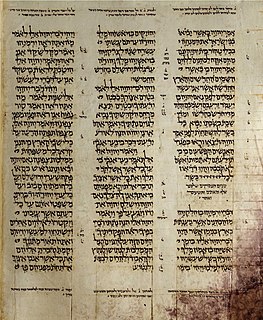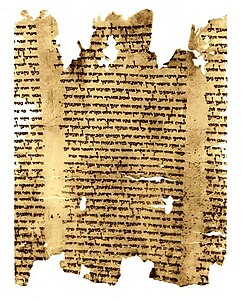
1 Thessalonians 5 is the fifth chapter of the First Epistle to the Thessalonians in the New Testament of the Christian Bible. It is authored by Paul the Apostle, likely written in Corinth in about 50-51 CE for the church in Thessalonica. This chapter contains a message about Christ's second coming, and various final exhortations and greetings.
Isaiah 49 is the forty-ninth chapter of the Book of Isaiah in the Hebrew Bible or the Old Testament of the Christian Bible. This book contains the prophecies attributed to the prophet Isaiah, and is one of the Books of the Prophets. Chapters 40-55 are known as "Deutero-Isaiah" and date from the time of the Israelites' exile in Babylon. This chapter includes the second of the songs of the "Suffering Servant".
Isaiah 51 is the fifty-first chapter of the Book of Isaiah in the Hebrew Bible or the Old Testament of the Christian Bible. This book contains the prophecies attributed to the prophet Isaiah, and is one of the Books of the Prophets. Chapters 40-55 are known as "Deutero-Isaiah" and date from the time of the Israelites' exile in Babylon. This chapter expresses the consolation of the Lord offered to the people of Israel.
Isaiah 41 is the forty-first chapter of the Book of Isaiah in the Hebrew Bible or the Old Testament of the Christian Bible and the second chapter of the section known as "Deutero-Isaiah", dating from the time of the Israelites' exile in Babylon. This book contains the prophecies attributed to the prophet Isaiah, and is one of the Books of the Prophets.
Isaiah 10 is the tenth chapter of the Book of Isaiah in the Hebrew Bible or the Old Testament of the Christian Bible. This book contains prophesies attributed to the prophet Isaiah, and is one of the Prophetic Books.
Isaiah 12 is the twelfth chapter of the Book of Isaiah in the Hebrew Bible or the Old Testament of the Christian Bible. This book contains the prophecies attributed to the prophet Isaiah, and is one of the Books of the Prophets. The Cambridge Bible for Schools and Colleges describes this chapter as "the lyrical epilogue to the first great division of the book ".
Isaiah 24 is the 24th chapter of the Book of Isaiah in the Hebrew Bible or the Old Testament of the Christian Bible. This book contains the prophecies attributed to the prophet Isaiah, and is one of the Books of the Prophets. Chapters 24-27 of Isaiah constitute one unit of prophecy sometimes called the "Isaiah Apocalypse". Chapter 24 contains the prophecy on the destruction of Judah for its defilements and transgressions, while a remnant will praise God, and God, by his judgments on his people and their enemies, will advance his kingdom.
Isaiah 26 is the twenty-sixth chapter of the Book of Isaiah in the Hebrew Bible or the Old Testament of the Christian Bible. This book contains the prophecies attributed to the prophet Isaiah, and is one of the Books of the Prophets. Chapters 24-27 of Isaiah constitute one continuous poetical prophecy, sometimes called the "Isaiah Apocalypse".
Isaiah 28 is the twenty-eighth chapter of the Book of Isaiah in the Hebrew Bible or the Old Testament of the Christian Bible. This book contains the prophecies attributed to the prophet Isaiah and is one of the Books of the Prophets. The Jerusalem Bible groups chapters 28-35 together as a collection of "poems on Israel and Judah".
Isaiah 32 is the thirty-second chapter of the Book of Isaiah in the Hebrew Bible or the Old Testament of the Christian Bible. This book contains the prophecies attributed to the prophet Isaiah, and is one of the Book of the Prophets. The Jerusalem Bible groups chapters 28-35 together as a collection of "poems on Israel and Judah". Unlike the previous chapters, this chapter makes no reference to "the overthrow of the Assyrians".
Isaiah 44 is the forty-fourth chapter of the Book of Isaiah in the Hebrew Bible or the Old Testament of the Christian Bible. This book contains the prophecies attributed to the prophet Isaiah, and is a part of the Books of the Prophets.
Isaiah 45 is the forty-fifth chapter of the Book of Isaiah in the Hebrew Bible or the Old Testament of the Christian Bible. This book contains the prophecies attributed to the prophet Isaiah, and is one of the Books of the Prophets.
Isaiah 47 is the forty-seventh chapter of the Book of Isaiah in the Hebrew Bible or the Old Testament of the Christian Bible. This book contains the prophecies attributed to the prophet Isaiah, and is a part of the Books of the Prophets. Isaiah 40-55 is known as "Deutero-Isaiah" and dates from the time of the Israelites' exile in Babylon. Chapter 47 concerns the fall of Babylon, which is personified as a woman, "the virgin daughter of Babylon", "daughter of the Chaldeans", no longer to be called "the Lady of Kingdoms" or "a Lady for ever".
Isaiah 54 is the fifty-fourth chapter of the Book of Isaiah in the Hebrew Bible or the Old Testament of the Christian Bible. This book contains the prophecies attributed to the prophet Isaiah, and is one of the Books of the Prophets. Chapters 40-55 are known as "Deutero-Isaiah" and date from the time of the Israelites' exile in Babylon.
Isaiah 55 is the fifty-fifth chapter of the Book of Isaiah in the Hebrew Bible or the Old Testament of the Christian Bible. This book contains the prophecies attributed to the prophet Isaiah, and is one of the Books of the Prophets. Chapters 40-55 are known as "Deutero-Isaiah" and date from the time of the Israelites' exile in Babylon.
Isaiah 61 is the sixty-first chapter of the Book of Isaiah in the Hebrew Bible or the Old Testament of the Christian Bible. This book contains the prophecies attributed to the prophet Isaiah, and is one of the Books of the Prophets. Chapters 56-66 are often referred to as Trito-Isaiah. In chapters 60–62, "three magnificent chapters", the prophet "hails the rising sun of Jerusalem’s prosperity". According to Luke 4:17, Jesus, visiting the synagogue at Nazareth, was handed "the book of the prophet Isaiah" and "found the place" where the opening verses of this chapter were written. The New King James Version sub-titles this chapter "The Good News of Salvation".
Isaiah 62 is the sixty-second chapter of the Book of Isaiah in the Hebrew Bible or the Old Testament of the Christian Bible. This book contains the prophecies attributed to the prophet Isaiah, and is one of the Books of the Prophets. Chapters 56-66 are often referred to as Trito-Isaiah. In chapters 60-62, "three magnificent chapters", the prophet "hails the rising sun of Jerusalem’s prosperity".
Isaiah 63 is the sixty-third chapter of the Book of Isaiah in the Hebrew Bible or the Old Testament of the Christian Bible. This book contains the prophecies attributed to the prophet Isaiah, and is one of the Books of the Prophets. Chapters 56-66 are often referred to as Trito-Isaiah.

Jeremiah 23 is the twenty-third chapter of the Book of Jeremiah in the Hebrew Bible or the Old Testament of the Christian Bible. This book contains prophecies attributed to the prophet Jeremiah, and is one of the Books of the Prophets.

Jeremiah 33 is the thirty-third chapter of the Book of Jeremiah in the Hebrew Bible or the Old Testament of the Christian Bible. It is numbered as Jeremiah 40 in the Septuagint. This book contains prophecies attributed to the prophet Jeremiah, and is one of the Books of the Prophets.



